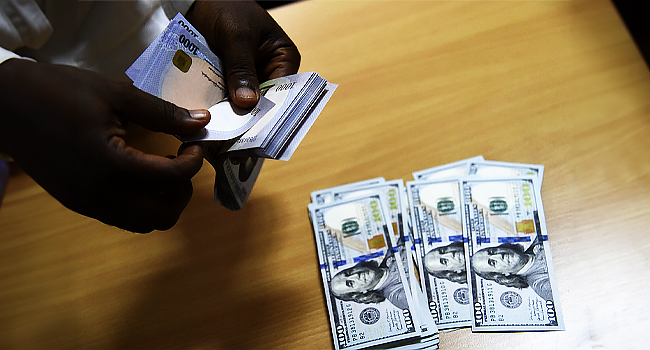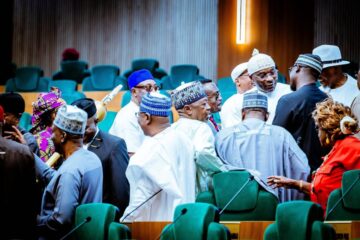
A man exchanges Nigeria’s currency Naira for US dollars in Lagos, Nigeria (Photo by PIUS UTOMI EKPEI – AFP)
Fitch Solutions, a financial intelligence service provider, has predicted that the Naira would depreciate to N1,993 per USdollar by 2028.
A report by the company’s subsidiary, BMI Research, further said despite expected rebound in the economy, Nigeria’s medical devices market will continue to face operational and demand headwinds over the near term.
“Nigeria’s medical device market will grow at a 2023-2028 compound annual growth rate (CAGR) of 10.8% in local currency terms and 9.6% in US dollar terms, taking market value to N171.1billion (USD344.7million) by 2028,” the report said.
It added, “We do believe that improving health spending through a focus on universal health coverage coupled with large population size and double burden of chronic and communicable diseases will sustain high demand for all medical devices, particularly diagnostics, consumables and hospital equipment over the near to medium term.
“For instance, in 2022, the country signed the National Health Insurance Authority Bill into law, making health insurance mandatory for citizens and legal residents.”
Listing Sanofi and GlaxoSmithKline as firms that left the country due to the naira devaluation, the report said the continued weakness of the currency would increase medical device import costs and erode consumer purchasing power.
According to the Fitch’s subsidiary, several challenges remain for local manufacturing of medical devices to take off in Nigeria, despite government incentives.
“Similar to other markets in sub-Sahara Africa, Nigeria heavily relies on medical device imports, with reliance of over 95%. We expect that the naira will end 2028 at N1993/USD from N306/USD in 2018.
“As the naira weakens, the cost of importing medical devices will continually increase, eroding both the health system and patient purchasing power especially to invest in essential medical technologies given underfunding of the public health sector.
“This would particularly affect high-cost demand for devices such as diagnostics, orthopaedics and dental products.
“On the export front, a weaker naira will enhance the competitiveness of locally manufactured medical devices, fostering growth in the sector.
“For instance, in June 2024, President Bola Ahmed Tinubu signed an executive order to reduce medical service costs amid high inflation.
“This order eliminates tariffs, excise duties as well as VAT on specific machinery, equipment, and raw materials, aiming to cut local production costs and enhance competitiveness.
“The order targets healthcare products including pharmaceuticals, diagnostics, medical devices, biologicals and medical textiles.”











